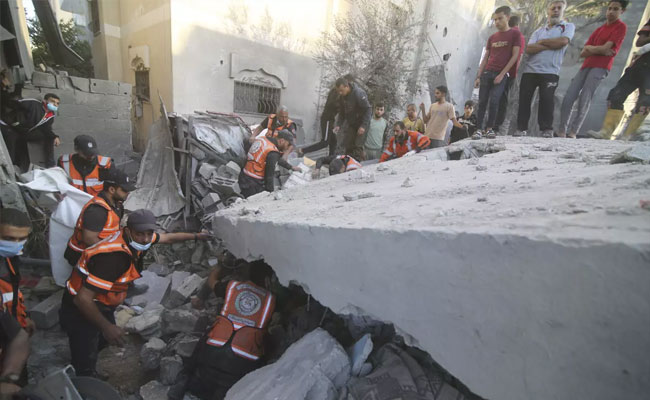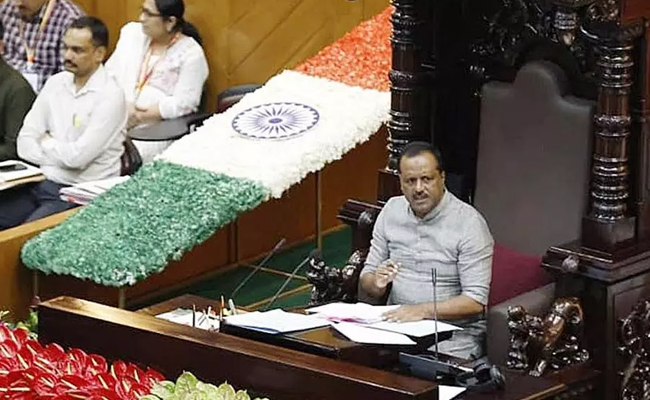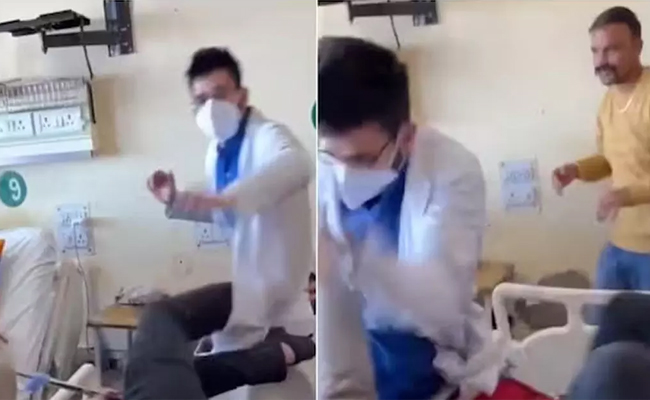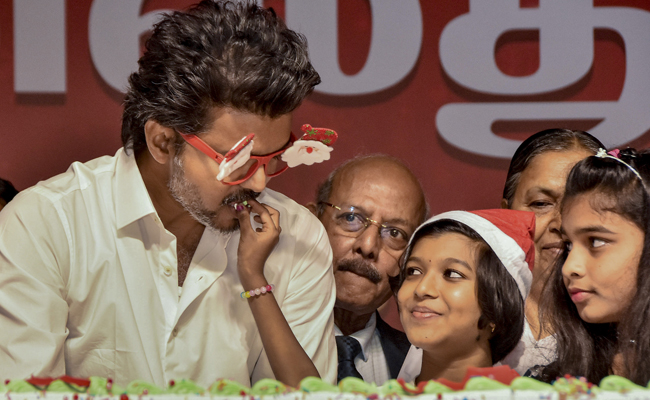Gaza City (AP)/PTI: Water has run out at UN shelters across Gaza as thousands packed into the courtyard of the besieged territory's largest hospital as a refuge of last resort from a looming Israeli ground offensive and overwhelmed doctors struggled to care for patients they fear will die once generators run out of fuel.
Palestinian civilians across Gaza, already battered by years of conflict, were struggling for survival Sunday in the face of an unprecedented Israeli operation against the territory following a Hamas attack on Oct 7 that killed 1,300 Israelis.
Israel has cut off the flow of food, medicine, water and electricity to Gaza, pounded neighbourhoods with airstrikes and told the estimated 1 million residents of the north to flee south ahead of Israel's planned attack. The Gaza Health Ministry said more than 2,300 Palestinians have been killed since the fighting erupted last weekend.
Relief groups called for the protection of the over 2 million civilians in Gaza urging an emergency corridor be established for the transfer of humanitarian aid.
"The difference with this escalation is we don't have medical aid coming in from outside, the border is closed, electricity is off and this constitutes a high danger for our patients," said Dr Mohammed Qandeel, who works at Nasser Hospital in the southern Khan Younis area.
Doctors in the evacuation zone said they couldn't relocate their patients safely, so they decided to stay as well to care for them.
"We shall not evacuate the hospital even if it costs us our lives," said Dr Hussam Abu Safiya, the head of pediatrics at Kamal Adwan Hospital in Beit Lahia.
If they left, the seven newborns in the intensive care unit would die, he said. And even if they could move them, there is nowhere for them to go in the 40-km-long (25-mile-long) coastal territory. "Hospitals are full," Abu Safiya said. The wounded stream in every day with severed limbs and life-threatening injuries, he said.
Other doctors feared for the lives of patients dependent on ventilators and those suffering from complex blast wounds needing around-the-clock care. Doctors worried entire hospital facilities would be shut down and many would die as the last of fuel stocks powering their generators came close to running out. United Nations humanitarian monitors estimated this could happen by Monday.
At Shifa Hospital in Gaza City, the heart of the evacuation zone, medical officials estimated at least 35,000 men, women and children crammed into the large open grounds, in the lobby and in the hallways, hoping the location would give them protection from the fighting. "Their situation is very difficult," said hospital director Mohammed Abu Selmia.
Hundreds of wounded continue to come to the hospital every day, he said.
About half a million Gaza residents have taken refuge in UN shelters across the territory and are running out of water, said Juliette Touma, a spokesperson for the UN's Palestinian refugee agency, known by the acronym UNRWA. "Gaza is running dry," she said, adding that UN teams have also begun to ration water.
Touma said a quarter of a million people in Gaza moved to shelters over the past 24 hours, the majority of which are UN schools where "clean water has actually run out," said Inas Hamdan, another UNRWA spokeswoman.
Across Gaza, families rationed dwindling water supplies, with many forced to drink dirty or brackish water.
"I am very happy that I was able to brush my teeth today, can you imagine what lengths we have reached?" said Shaima al-Farra, in Khan Younis.
Let the Truth be known. If you read VB and like VB, please be a VB Supporter and Help us deliver the Truth to one and all.
Bengaluru (PTI): Bengaluru City Police (BCP) on Monday said that it has, in collaboration with cab aggregator platforms Uber and Ola, implemented a technology-driven integration aimed at enhancing the safety of riders and drivers.
It would also strengthen emergency response mechanisms across the city.
As part of this initiative, emergency call facilities have been incorporated within the Uber and Ola mobile applications used for booking rides, it said.
ALSO READ: Doctor assaults patient at Shimla hospital; probe ordered as video sparks protest
Through this integration, riders and drivers seeking emergency assistance can directly share real-time location data, trip details, and contact information with Bangalore City Police's 112 emergency response infrastructure from within the Uber/Ola app itself, an official release said.
Noting that this seamless flow of critical information enables quicker police access during emergencies, facilitating faster response times and potentially life-saving interventions by first responders, it said the initiative is a significant step towards leveraging technology partnerships to ensure safer urban mobility and improved public safety.





